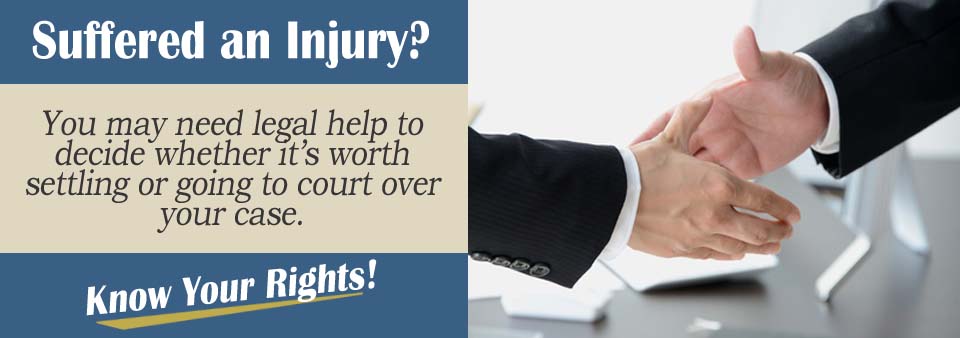Going to trial is not always the best decision when it comes to a personal injury case. Sometimes simply settling outside of court is the better of the two options. How do you know which one is the right choice for you?
We have asked attorney, Alaina Sullivan, to clarify the differences between the two. Here is what she had to say:
What Is a Settlement?
A settlement is essentially a resolution, put formally into writing, of a legal dispute without the court having to hear the matter. If you were to take your case to court, you would either go before a jury or a judge, meaning you would be given whatever decision either of those two entities decide.
Settlement can happen any time along the way, including before the case even goes to court to in the midst of litigation. Any type of agreement that is reached between the parties themselves is deemed to be a settlement.
Why Should I Settle?
Settling outside of court is not a bad thing. Many people worry that means they are giving up or giving the insurance company what they want by not taking their case to court. That is so far from the truth. The fact of the matter is, most cases do settle and for good reason.
The following explore the different benefits of taking a settlement instead of going to trial.
It Is Cheaper?
Going to court is expensive. It is safe to assume that the attorney taking your case is not handling your matter on a free basis. Court proceedings involve subpoenaing expert witnesses, taking depositions, working with multiple attorneys, and travel.
The discovery process alone can cost thousands of dollars. While most attorneys handle personal injury trials on a contingent fee basis, this means that once you are given your damages award, a significant percentage of that goes towards your attorney.
Further, certain upfront expenses like filing fees, expert witness payments and others are requested before any award is given, and most attorneys will require clients to front those costs. Settlement reduces the time taken to resolve a case, which reduces the amount of lawyer's fees that would be taken from that amount.
Settlements Are Private
Any facts brought out in settlement discussions are confidential and cannot be later used against you in trial should settlement discussions not be successful. However, any facts that come out in litigation are a matter of public record.
Many people choose this route to avoid having to testify and be cross-examined, having those statements made be a part of public record.
Settlements Reduce Stress Involved
Legal actions are stressful. The unknown of how the judge or jury will rule leads to a lot of anxiety and uncertainty. The stress of having to testify and be cross-examined is significant, and the lengthy process of getting to court and to a final ruling can be a lot to handle, as well.
Settlement negotiations outside of court reduce that level of stress, and that aspect alone is why people choose to settle.
The Amount is Final
The problem with so many personal injury actions is the process can take years if not a decade. A jury or judge ruling is not necessarily final. If the insurance company loses at trial, they can appeal. The appellate process can take even longer, and even after the second appeal, the case can then go up to the state’s supreme court.
Further, if the appeals court remands the case for a new hearing, the trial court then has to go through the process again. That number you were given at the end of trial is not the final number by any means, and you should not expect that money as quickly as you would like.
You Control the Process
With settlement negotiations, you and the other party are the one making the decisions. You have control over the terms of the agreement. If you take your case to court, you are putting your case in the hands of a stranger or group of strangers essentially.
They are the ones deciding your fate, and the odds are, the decision they come to might not be everything you would want. Settlements put you in control, which appeals to many who face personal injury cases.
Settlement Is Not for Everyone
However, that being said, not every case is suitable for settlement. When you believe the other side is not negotiating in good faith or when important issues that go to the core of the case, like fault or liability, are in dispute, it often makes more sense to litigate.
Keep in mind that should you begin the process, you are more than welcome to settle along the way. Many times, simply starting the litigation process is enough to scare the other side into playing fair.
Contact an Attorney Today
Deciding whether your case would be viable in court or if it's better to settle is something you may need legal help to determine. With a personal injury attorney, you can rely on them to represent your interests, either in court or in dealing with the insurance company.
